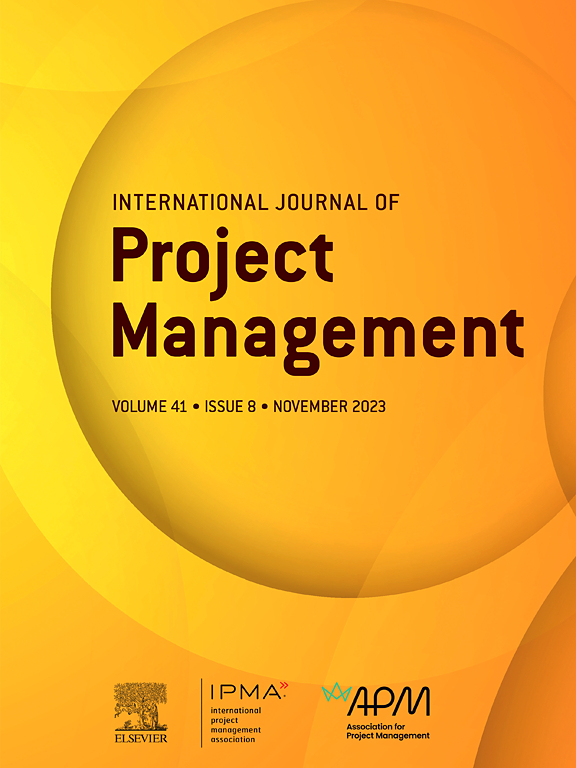How building information modelling mitigates complexity and enhances performance in large-scale projects: Evidence from China
IF 7.5
1区 管理学
Q1 MANAGEMENT
International Journal of Project Management
Pub Date : 2025-02-01
DOI:10.1016/j.ijproman.2025.102694
引用次数: 0
Abstract
Despite project complexity and large-scale project management being research hotspots in project management, the existing research has not fully considered the influence of building information modelling implementation on project complexity. In order to fill this research gap, this study used quantitative and qualitative methods to explore the impact of building information modelling on project complexity and large-scale project management performance and to verify the mediating role of project complexity between building information modelling and large-scale project management performance. The results show that: 1) The implementation of building information modelling in large-scale projects can significantly mitigate project complexity (technology, goals, information, organization, and environment); 2) Information and goal complexity have a significantly negative impact on large-scale project management performance; 3) Utilizing building information modeling to reduce information and goal complexity can significantly improve the management performance of large-scale projects; 4) Besides reducing project complexity, applying building information modelling can directly improve large-scale project management performance; 5) The improvement of policies and standards, the cultivation of information technology talents (personal incentives), project management process reengineering and innovation, and data governance are conducive to exert the values of building information modelling in project management. These findings not only enrich theoretical research but also provide valuable decision-making references for managers to improve management performance, driving the development of informatization and intelligence in the construction industry.
建筑信息模型如何减轻大型项目的复杂性并提高绩效:来自中国的证据
尽管项目复杂性和大规模项目管理是项目管理的研究热点,但现有研究并未充分考虑建筑信息建模实施对项目复杂性的影响。为了填补这一研究空白,本研究采用定量和定性相结合的方法,探讨了建筑信息建模对项目复杂性和大型项目管理绩效的影响,验证了项目复杂性在建筑信息建模与大型项目管理绩效之间的中介作用。结果表明:1)在大型项目中实施建筑信息建模可以显著降低项目复杂性(技术、目标、信息、组织和环境);2)信息和目标复杂性对大型项目管理绩效有显著的负向影响;3)利用建筑信息建模降低信息和目标复杂性,可以显著提高大型项目的管理绩效;4)在降低项目复杂性的同时,应用建筑信息模型可以直接提高大型项目的管理绩效;5)政策标准的完善、信息技术人才的培养(个人激励)、项目管理流程的再造与创新、数据治理等有利于发挥建筑信息建模在项目管理中的价值。这些发现不仅丰富了理论研究,也为管理者提高管理绩效,推动建筑业信息化、智能化发展提供了有价值的决策参考。
本文章由计算机程序翻译,如有差异,请以英文原文为准。
求助全文
约1分钟内获得全文
求助全文
来源期刊

International Journal of Project Management
MANAGEMENT-
CiteScore
12.30
自引率
26.20%
发文量
83
审稿时长
59 days
期刊介绍:
The International Journal of Project Management is recognized as a premier publication in the field of project management and organization studies. Our main objective is to contribute to the advancement of project management and project organizing through the publication of groundbreaking research.
We are dedicated to presenting fresh insights and new knowledge in various domains, including project management, program management, portfolio management, project-oriented organizations, project networks, and project-oriented societies. We actively encourage submissions that explore project management and organizing from the perspectives of organizational behavior, strategy, supply chain management, technology, change management, innovation, and sustainability.
By publishing high-quality research articles and reviews, we strive to revolutionize the academic landscape and propel the field of project management forward. We invite researchers, scholars, and practitioners to contribute to our journal and be a part of the progressive development in this exciting field.
 求助内容:
求助内容: 应助结果提醒方式:
应助结果提醒方式:


